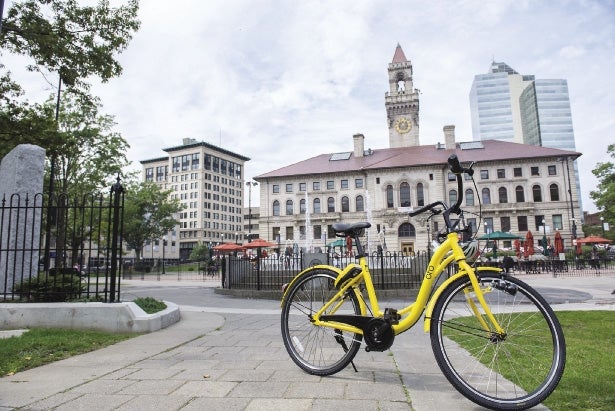Worcester likely wouldn’t strike anyone as a good city for bicycling. Against all that, bicycling as commuting is growing fast in Worcester.
Against all that, bicycling as commuting is growing fast in Worcester.
Ofo, a bikeshare program with 400 bikes, started last month, a few months after a pedicab service called WooRides began. Worcester Polytechnic Institute has found success with its bikeshare program for students and staff, and Clark University and Worcester State University have had smaller programs for several years.
Worcester joins the bikeshare world as more than 25 million bikes were used in bikeshare programs last year, five times as much as in 2012, according to the National Association of City Transportation Officials.
China-based ofo picked Worcester as only the second American city where it operates, finding that the criteria it looks for – size, layout, population demographics – all made Worcester a good fit, said Grace Lin, the company’s vice president for the United States.
“It turned out that Worcester and ofo were a mutually good fit,” said Lin, whose company uses all lowercase letters so that its name looks something like a person hunched over a bike.
Starting at the colleges
WPI’s bikeshare program started last school year as a student’s major research project turned reality. Kevin Ackerman, now a graduate student there, looked at other college campuses with bike programs and created a detailed proposal for exactly what a similar one at WPI would look like.
Gompei’s Gears – named after the school mascot – tallied up 1,400 registered users, representing one-fifth of the WPI campus community, and 7,000 trips last school year.
“I don’t think we realized how popular this bike program was going to be,” said Liz Tomaszewski, the college’s associate director of sustainability.
Clark’s program includes about 10 refurbished bikes kept under a canopy just outside the Higgins University Center. Someone looking to borrow a bike first chooses a bike, goes to the campus information desk, and takes a key to unlock that bike.
The program was pitched by students in a sustainability class, said Ben Gardner, Clark’s assistant director of community engagement. Clark students use the bikes to get off campus, for a grocery run or to make it to work.
“It’s all about creating that access for students,” Gardner said.
Worcester State created its own program modeled in part on Clark’s. The school keeps bikes at three small stations. About half the bikes are on long-term loan to international students, said Mark Wagner, the director of the Binienda Center for Civic Engagement.
The program has about 150 people signed up, with about 30 repeat users over the course of the school year, Wagner said.
Creating a bike-safe Worcester
The group WalkBike Worcester has advocated for safer roads, particularly Chandler and Pleasant streets through the city’s western neighborhoods and Stafford Street in South Worcester.
Jerry Powers, a WalkBike Worcester co-chair, said he had been encouraging more physical activity around the city but found it wasn’t always practical because of the lack of bike lanes.
“I quickly realized that’s just not feasible here in Worcester,” he said.
Already, bike lanes have been put in place on Green Street, Water Street and a few other locations. An overhaul of Main Street will add bikes lanes in both directions by reducing the number of travel lanes from four to two and eliminating some parking.
The city plans to install 30 bike racks this fall, and a detailed plan for bikes will be included in a soon-to-come master plan. A program City Manager Edward Augustus plans to approve this fall would require street projects to incorporate bike- and pedestrian-friendly features.
“We’re going to see the city much improved for bike users,” Augustus said.
Ofo tracks where bikes are ridden, which may help determine what streets might most need bike lanes.
Making bikes a business
In June, a pedicab service called WooRides began offering rides starting at $5. Every additional quarter-mile is another $5 – more than someone would pay Uber, but a different and emissions-free experience. They’re available Thursday through Saturday nights, most often ferrying people from restaurants to bars to home in areas like the Canal District.
“We’ve definitely been solidly growing, which is good.” said Shahbaz Soofi, a co-founder and a 2014 WPI graduate.
For all the work Soofi has put into WooRides, he sees ofo’s bikeshare program less as competition and more as creating a bikeshare industry.
“We look at ofo as, the more the merrier,” he said.
Ofo does not require riders to bring bikes back to a docking station. Instead, riders can grab any unused bike through an app. Rides are $1 an hour.
In the first several weeks, each of the first 200 bikes initially in Worcester was ridden an average of three times a day, said Lin, the ofo vice president.
“The ridership has been very good so far,” she said.
Ofo isn’t exactly starting small in Worcester. The 400 bikes it’s delivered to the city are more than are available in bikeshare systems in Atlanta, Baltimore, Cleveland or Houston, according to the National Association of City Transportation Officials.
Even more bikes could come. Augustus said the city has received interest from other bikeshare programs about bringing their systems to Worcester.

